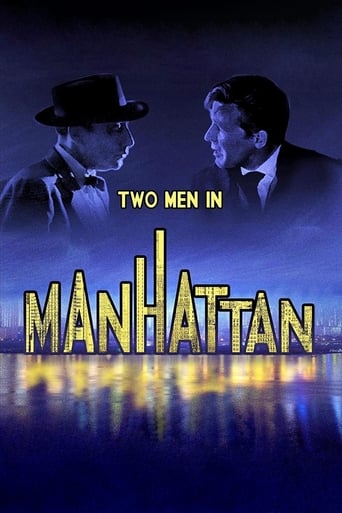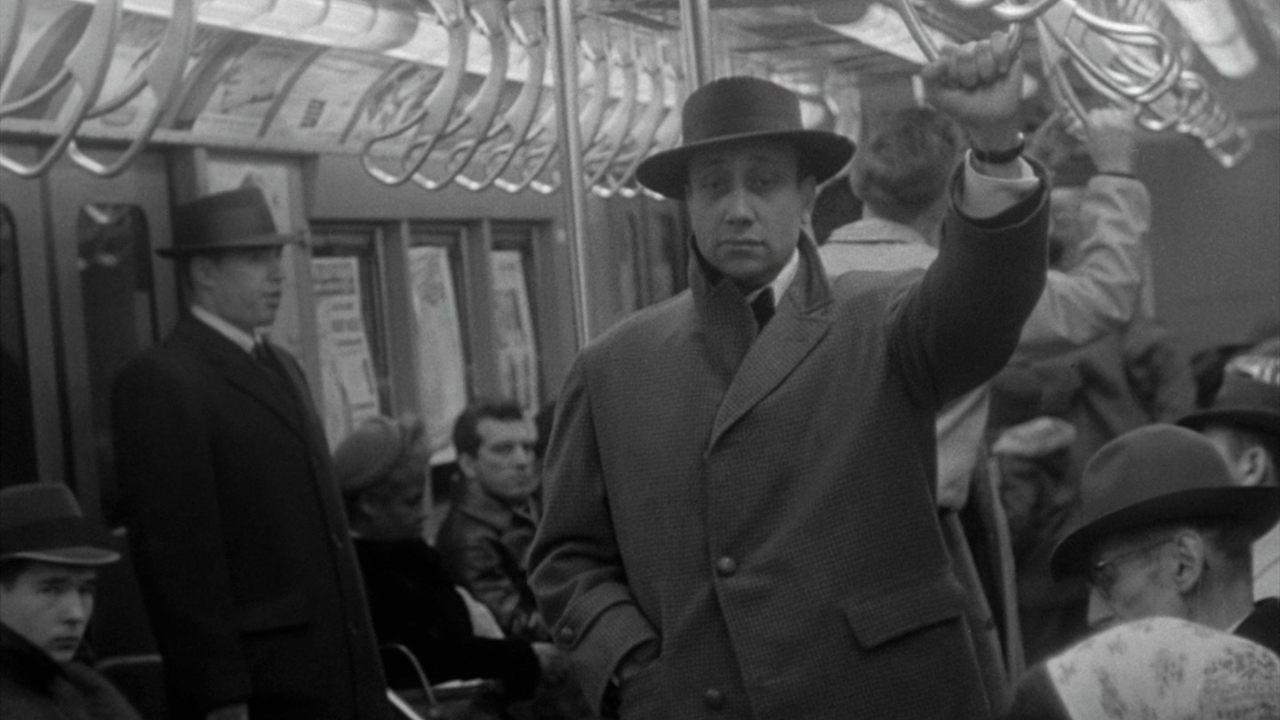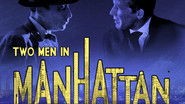treywillwest
At first, one has a sense that this is almost a mid-career home movie by Jean-Pierre Melville, but by the end it was one of the most satisfying films I've seen by this director.
It should surprise no one that Melville would be in love with urban America. His Paris longs to be New York, or really the Great American City of Noir, with every turn of the street corner being a potential site for conspiracy and betrayal. For the first half of this film, Melville seems overwhelmed by the experience of being in Manhattan, and much of the early scenes feel like a man on vacation in his dream locale. Indeed, many of the shots seem intended to frame Melville, who plays the lead, in front of some iconically "New York" site.
But gradually the director finds his barrings and this becomes actually one of his more understated narratives: a character study of two men, a journalist and a photographer who at first seem similar, then very different, and perhaps ultimately similar again, as they wrestle with a simple, but decisive ethical choice.
mgtbltp
In French (Deux hommes dans Manhattan) is a 1959 New York City based French film-noir directed by Jean-Pierre Melville. Starring, Jean- Pierre Melville, Pierre Grasset, Music by Martial Solal, Christian Chevallier Cinematography by Nicolas Hayer Jean-Pierre Melville filmed both a Noir love letter and, almost a time capsule video documentary of 1958 New York City. From the opening bars of the jazzy score and Googie style credits that run over a wonderful (looking out the back window of a cab) trip down through traffic, a traffic of tail fin adorned cars, traveling South along Broadway, and then on 7th Avenue right through the heart of manically lit Times Square you know you are in for a special visual treat. Melville's New York is the real deal. Its not some Hollywood back lot dressed up like New York City. Melville's New York is a dreary smoggy winter sky New York. The old New York that belched black coal smoke by the ton into the atmo, a New York of steaming manholes in streets that were choked with Buses and Checker Cabs. Melville's New York was a Holiday Day New York festooned with Christmas decorations two days before December 25th. Two journalists become de facto detectives tracking down a missing diplomat through the underside of New York.Pierre Grasset is great as the smart-alek Delmas his picaresque portrayal is very effective playing against Melville who is relatively somber. The film has but few flaws, probably the most notable for me are the interior shots of the E.D.D.I.E. whorehouse, the actresses playing the hookers seem to be speaking English phonetically, and ditto for the stripper Bessie Reed or she may just be dubbed. The excellent soundtrack is by Christian Chevallier and Martial Solal. 8/10 Two Men In Manhattan is available on DVD from Cohen Films it's in French with English subtitles.
colaya
This is a road movie. We travel with two men through New York's nightlife in one night (hence the title of the film). The stops are Broadway performers, recording studios, burlesque dancers, brothels, iconic places such as Time Square, the UN building, Rockefeller Center, etc. and along the way we breathe the atmosphere, a jazz trumpet, the neon lights, hot dogs, shadows and dark alleys. The pretext for this ride (in this case the "plot": an investigation of a UN delegate disappearance and some dilemmas of yellow journalism) is just a pretext, as in any good journey. Recommended for road movie fans, New Wave connoisseurs, New Yorkers, jazz lovers, nightlife owls and noir-ish buffs.
Alice Liddel
'Nothing seems real. You don't exist. I must wake up' moans the failed suicide and actress, as she is gently pressured by journalist Moreau into revealing the whereabouts of her lover, missing UN diplomat, womaniser and Resistance hero Fevre-Berthier. Melville's most realistic film, shot amid the bright-neon signs of New York, is also a pure dream, its narrative unreeling over one very dark night, swamping its protagonists into mere silhouettes or fragments, as they walk and drive and drive and walk in an echo-laden, empty silence, punctuated by fierce jazz squalls.'Deux Hommes' is generally considered one of Melville's least successful films, and the director rejects it in his famous interviews with Rui Nogeuira, claiming that its failure made him seriously rethink his way of making films. It's not easy to see why it should be so disapproved of. The narrative is brisk if conventional, as it follows a traditional detective story route of problem, investigation, solution. Perhaps what is most objectionable is the film's theme, the idea that sometimes it is honourable and proper to conceal the truth from the public.I may be biased - this was my first Melville film, eight years ago, beginning a love affair that is even more intense today - but I think 'Deux Hommes' is pretty good, for a number of reasons. Most immediate is Melville's use of light and darkness, the way he works between blazing neon and dense obscurity, as he does between noise and silence or sharp montage and Wyler-like deep-focused long-takes. This visualises the theme of the film, the darkness of the 'victim''s absence brought to light by the investigative journalists, with truth thrown back into the darkness.Although Melville's heroes seem less 'deconstructed' here than in his most famous films, he uses subtly elaborate means to undermine them. Throughout, they are in a position of power, moving with ease through the different worlds of New York, from burlesque houses and brothels to expensive bourgeois apartments, linking two seemingly disparate realms. When interviewing people who knew Fevre-Berthier, Moreau remains rigidly framed, while his interlocutors are shot from different angles, cut up, fragmented, figuring his unbreakable integrity, and their dissimulating multiple identities.But Moreau, for all his supposed decency, is never as powerful as he thinks. His firm point of view is often broken up by unmotivated angles that problematise scenes he dominates. He is frequently swallowed up in darkness, his authority literally disappearing. God-like camera angles looking down on him mirror the car that follows him - unlike a conventional detective, he has less information than we do, and so is emasculated. His body is sometimes broken up by Melville's compositions, particularly when the pair come out of Capitol Studios, and are shot from inside a car, watched by an unseen stranger, or in the climactic chase, as he keeps getting out and back into the car, his head repeatedly lopped off.this undermining is linked to the theatrical metaphors strewn throughout. The four women interviewed are all linked to performance - an actress, a singer, a call-girl pretending to be Marilyn Monroe, and a stripper. Dalmas mimics Fevre-Berthier, and invents a different death for the victim, just as Moreau and his boss finally do. The men play the role of brother and friend to sneak into the hospital. They repeatedly enact what they're going to do or see. Throughout the film we get shots of the surface of New York, as if nothing has changed, but once we have penetrated the world beneath the glitter, it is impossible to take these signs, or these men, in the same way again.Unusually for a Melville 'crime' film, the protagonists are detectives and not gangsters. However, Melville uses similar tropes to his gangster films to further undermine his heroes. The hospital scene is familiar from these films, the shaking up of someone with information, Moreau waiting outside like a boss, while his henchman does the dirty work. Moreau, throughout the sequence, with his 'gentle' persuasiveness, becomes genuinely sinister.As they wait with the corpse in his lover's apartment, Moreau and Dalmas are visited by the editor, the 'Boss', wearing shades - his dealing with the body, his wearing shades indoors, his re-arrangement of the truth are all gangster staples, and yet he is the editor of a reputable magazine, determined to bury the truth about a Churchill-praised Resistance hero.Melville is often acclaimed/reviled as France's greatest Americophile. It is here significant that Melville the director is also the lead actor, because just as the actor goes through a real geographical space, the director goes through an imagined cultural space of favoured American landmarks, Time Square, Broadway, Mercury Theatre, Time Magazine, Capitol Studios etc. The anti-hero's name is Delmas, a reference perhaps to John Dalmas, Chandler's prototype Philip Marlowe.This kind of allusionism further destabilises the film's realism, as do narratively irrelevant shots of cigarette packets, the brand smoked by Melville's one-time friend Godard. Melville is always pushing back the limits of his genre, the hilarious, 'A Bout de Souffle'-like jazz-warnings to remind us of the car following our heroes, the car-lights seem to wink at us, as if we're both in on the joke on the heroes. In a very striking scene, flagrantly breaking 'plausibility', Moreau gets into the driver's seat with the address card of their next destination. The soundtrack suggests they start up and drive off, but the camera stays in an immovable car on the driver holding the card. In the penultimate scene, as Delmas lays slumped on the floor, the band that had been the act become the audience; a trumpeter approaches and blows with mock-melancholy.There is so much more in this deceptive, short film that deserves a reconsideration, especially for its incredibly detailed technique that never forces itself, but is very rich. But the film works best for me as a (Hustonian?) study in failure, of the film's other hapless womaniser, Delmas, a great talent doused in impotence and drink, prepared to do vicious things for a break, a man who could have had everything, but seems shell-shocked by life, who can only find beatitude through alcohol. Rather him than the deeply creepy probity of his partner.


 AD
AD


